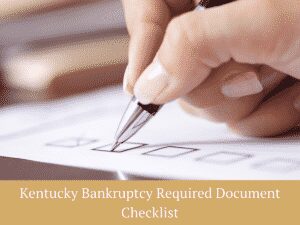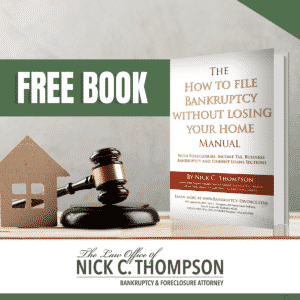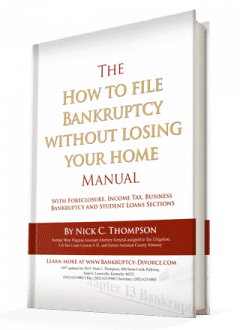Our Bankruptcy Checklist explains what documents you need to file bankruptcy. Judges and Trustees understand most bankruptcy clients tell the truth. However, they require documentation to verify your income, assets, debts, and expenses. This is simple. You can typically file a Chapter 7 if you have:
- A low income
- Take the required credit counseling and debtor education, and have
- few assets and
- have not filed a Chapter 7 bankruptcy within the prior eight years and gotten a discharge.
We recommend downloading or printing a copy of our Kentucky Bankruptcy Checklist. When you have gathered your documents to file with us, here are your options:
- You can scan your documents and email them to Office@Bankruptcy-Divorce.com.
- You can fax documents to 502-625-0940.
- You can bring a hard copy to our office, and we will scan the documents or
- You can upload the documents in PDF format when you complete your intake online.
Also, please note the following:
- Organize the documents by dates in groups.
- Please pick up your originals after we scan them. We do not store your documents.
- If you don’t pick up your documents, we destroy paper copies after scanning them into PDF format and the 341 meeting.
Bankruptcy filing documents we rarely ask for
A bankruptcy petition may require legal documents or financial documents you would not expect, such as your child support or alimony award, or divorce settlement.
Some non-standard documents verify income, expenses, assets, and debts but are requested to verify unusual expenses such as a high day care expense or asset valuation. These rarely requested additional documents include medical bills, credit reports, paystubs, child support payments, and damaged property repair estimates. Businesses will need monthly profit or yearly profit and loss statements. We are required to check your social security number, pay stubs, and driver’s license to prove your identity.
Kentucky Bankruptcy Required Document Checklist
1. Chapter 7 cases require prior six months of bank statements.
You must supply the statements for every bank account in your name for the prior six months. Include any joint accounts for the prior six months, such as bank accounts with a spouse or family. Remember, homes, cars, and bank accounts in your parent’s or children’s names belong to you as an asset.
If you are on the deed, car title, or bank account, those items are assets. Louisville Chapter 13 cases do not require a copy of your bank statements. However, in Eastern Kentucky and Southern Indiana, you also need to supply the bank statement for the month you filed if that statement was not available on the date of filing.

2. Chapter 7 and Chapter 13 cases require proof of household income for prior 6 months.
Filing bankruptcy requires proof of your income. The local bankruptcy court requires the prior six months of pay stubs, your veteran’s benefit, disability, and social security benefit letters.
Household income is a husband and wife’s combined income, even if only one person is filing. A spouse may not be filing with you. However, the Court uses household income to determine income for the means test and calculating any Chapter 13 plan payment.
Your payroll or bank statements may need updating if you wait to file your bankruptcy. You may be better off filing in the name of just one spouse. If a Chapter 13 plan fails, you can file in the other spouse’s name.
3. Chapter 7 and Chapter 13 require federal and state tax returns for the prior 2 Years.
IRS Transcripts are your account record. The transcript is not your tax return. We need your income tax returns for the prior two years to file. And you have to have filed for the previous four years. Tax account transcripts are required to ensure you waited long enough to bankrupt income taxes. We calculate whether you have waited long enough to make your tax obligation dischargeable. See our page on how to bankrupt income taxes.
The Court requires you to file the prior four years of income taxes to file bankruptcy. But, you only supply the previous two years of tax returns to the Court. The trustee reviews your income tax return to look for income, expenses, assets, gifts, and transfers.
4. Chapter 7 and Chapter 13 require vehicle titles, deeds, and mortgages.
The Trustee reviews titles for boats, cars, trailers, and motorcycles in your name. If you are on the title for mom’s home or car, you must include it. The Trustee is looking for proof that liens and mortgages were filed correctly. It is rare, but in 1 out of 1000 cases, the bank fails to file the lien on the car or mortgage on the home. In Jefferson County, we can get a recorded copy of the deed and mortgage. But in rural counties outside Jefferson County, we need the registered copy of your mortgage showing the recorded book and page number. Rural counties will often not have an online copy. The copy from your closing will not have the deed book and page number.
For Jefferson County, we can search for liens, deeds, and mortgages on the County Clerk’s Website: search.jeffersondeeds.com. If you have been sued, removing any judicial lien while the bankruptcy is going on is essential. We may not know if you have a judicial lien or have been sued. You must tell us and remove the lien, or the case may close without stripping this lien, and you may have to pay it later.
5. Chapter 7 and Chapter 13 require identification, a copy of a driver’s license, and a social security card or W2.
We need a copy of your driver’s license and social security card to file the case. You may be able to substitute a W-2 for your social security card and military or other government photo ID for a driver’s license.
Complete the following tasks for the Kentucky Bankruptcy required document checklist.
- Complete our intake. It is best if you complete the MyChapter intake on our website. Just call, and Toni or I will start the intake for you, or you can email us your email address, name, and phone number. Our intake allows you to input your income, expenses, assets, and liabilities, along with the responses to about 26 questions in the statement of financial affairs. Be sure to list the name, address, and amount of all debts, including any alimony or child support. You will still discharge a debt even if it was not listed if your case is a no-asset case. Most Chapter 7 cases are a no asset case where nothing is repaid to creditors. However, Chapter 13 cases and Chapter 7 assets cases do not discharge debts that are not listed.
- Free credit reports are available at annualcreditreport.com. Do not sign up for credit monitoring. Credit reports are helpful to provide addresses and account numbers. If you have large or extraordinary expenses, you may be asked to provide proof of the expense (medical expenses, daycare, charity, etc.). Private schooling is often an allowed expense for a disabled child, but it is not deductible for religious purposes.
Complete your Credit Counseling and Debtor Education
- Complete your Credit Counseling Certificate. To prepare a petition, we only need your proof of income. However, the petition cannot be filed without the Credit Counseling Certificate. Services I recommend include bkcert.com, where they answer the phone 24 hours a day, seven days a week. It is a little more expensive, but it is speedy. Contact them at 866-859-7323. Start Fresh also offers courses online or by phone at 800-435-9138. Our attorney code is NT4459 for Start Fresh. For the cheapest service, my administrative assistant Toni likes prebk.com, which only costs about 15 dollars.
- Take the second “Debtor Education course” immediately after the case filing, or you might not receive a discharge. Every year, someone forgets to file the second course. Unfortunately, it costs about $635 to reopen the case and file the certificate after the case closes. You must pay a second filing fee plus about $300 in attorney fees to reopen the case and file these motions. Both BKcert and Fresh Start automatically file the certificates for you. Other services may not.
Additional steps you want to take as part of your Kentucky Bankruptcy Required Document Checklist.
- You may want to download the record-all calls app for your phone. I want you to seriously consider this because sometimes debt collectors call and violate the law by being untruthful, rude, or demanding payment after they know a Bankruptcy has been filed. They often deny making the call unless you have a copy. Recorded calls are admissible evidence in Kentucky if you wish to sue them for contempt or an FDCPA violation. We have a checklist to document the history of the debt collection calls. Keep any paperwork sent to you by a lender after filing.
- To strip a 2nd mortgage or judgment lien, complete our form for stripping a lien. If you own a home and someone sues you, you most likely have a judgment lien that needs stripping. Stripping this lien later becomes expensive.
- Review our credit counseling page. This page contains information about getting your credit report, replacing your social security card, and credit counseling certificate. We can prepare your petition without the credit counseling certificate, but we cannot file a bankruptcy filing without the credit counseling certificate.
- We have a page on the questions asked by the Trustee in the 341 meeting. Also, under the Bankruptcy tab, there is information on how to get a 725 FICO score after bankruptcy.
 Read the How to File Bankruptcy Manual.
Read the How to File Bankruptcy Manual.
Your bankruptcy will go much smoother, and you will get more benefits if you read our free “How to File Bankruptcy Manual.” The average person who doesn’t plan their bankruptcy loses about $8,000–10,000 dollars. Often, the cheap attorney doesn’t know the exemptions or how to strip a lien properly. Even if the attorney knows how to file appropriately, if the client doesn’t work with the attorney, you can fail to discharge debts or keep property.
Having a prepared client helps in the process of filing and getting debt relief. We pride ourselves on planning your bankruptcy. Furthermore, we believe the average person who spends 3–4 hours reading our book saves time, stress, and money. The truth is that clients don’t know what to avoid and what to do unless they educate themselves. Bankruptcies are much easier and more profitable if you understand and work with us to get your desired results.
⎆ The fees and costs you may expect.
- Filing Fee for a Chapter 7: $338.00.
- Filing Fee for a Chapter 13: $310.00 plus $28.00 for mailing the plan to creditors (it ends up being the same as Chapter 7)
- Chapter 13 Attorney Fees: You usually pay your attorney fees from your Chapter 13 payments unless you file at the last minute to stop a foreclosure. Some people file at the last minute to delay a foreclosure and have no intent or ability to save the home. Judges, therefore, want a couple of payments into the plan if you file at the last moment. It appears like you have the intent if you have set aside money to catch up on the mortgage or you have the first couple of Chapter 13 payments. All attorneys receive the same Chapter 13 fee by the Court. So, there is no need to save money by using a “cheap” attorney in Chapter 13. The worst attorney receives the same fee as the best attorney. It is possible to pay the filing fee in installments. But paying the filing fee in “installments” makes additional work for the court clerk and draws attention to your case.
- Chapter 7 Attorney Fees (for June 2021): Please note our attorney fees as of December 2024 have not changed since 2020. In 2020, they were 1400 for a single and 1600 for a joint Chapter 7. However, we expect a price increase in 2025 for attorney and filing fees. There has not been an increase since 2020. Many attorneys charge additional fees for services after filing.
- Single uncontested Chapter 7 filing with one home: $1,400.00 to be increased to 1600.
- Joint uncontested Chapter 7 filing with one home: $1,600.00 to be increased to 1800.
Attorney fees and no money down filing.
For Chapter 7, the rules require clients to pay their attorney fees upfront for pre-petition work before the case files. Any work the attorney does before filing the case is uncollectible, just like any other debt. Work done after the case is done is collectible by the attorney and is not affected by the bankruptcy stay or discharge. You bankrupt any unpaid attorney fees the minute you file, so generally, attorney fees have to be prepaid.
It may be hard to understand how strict this rule is. But it is just as tough as what creditors face when they attempt to collect unsecured debts post-filing. Listen here to Judge Lloyd ordering an investigation and prosecution of one local attorney for collecting after the case filing. She admonishes the attorney for unethical behavior for a whole hour and hauls in his clients for an investigation.
Contact us today.
We do cases in Kentucky and Southern Indiana. We also travel to Lexington, Bowling Green, and Covington at no additional charge. If you have questions about the Kentucky Bankruptcy Required Document Checklist, call us at 502-625-0903.
 Resources for Bankruptcy
Resources for Bankruptcy
Mortgage Modification Program Checklist
SBRA Small Business Bankruptcy Checklist
Credit Counseling to Meet Bankruptcy Requirements
Chapter 11 Business Bankruptcy Information
Short Sale Checklist in Louisville, Kentucky
If you are considering bankruptcy, don’t delay because timing is crucial. You can file too early or too late. I am here to help you. Bring in your documents and, contact my office immediately to start the conversation—Nick C. Thompson, Bankruptcy Lawyer: 502-625-0905. Again, here is the printable copy of the Kentucky Bankruptcy Required Document Checklist



